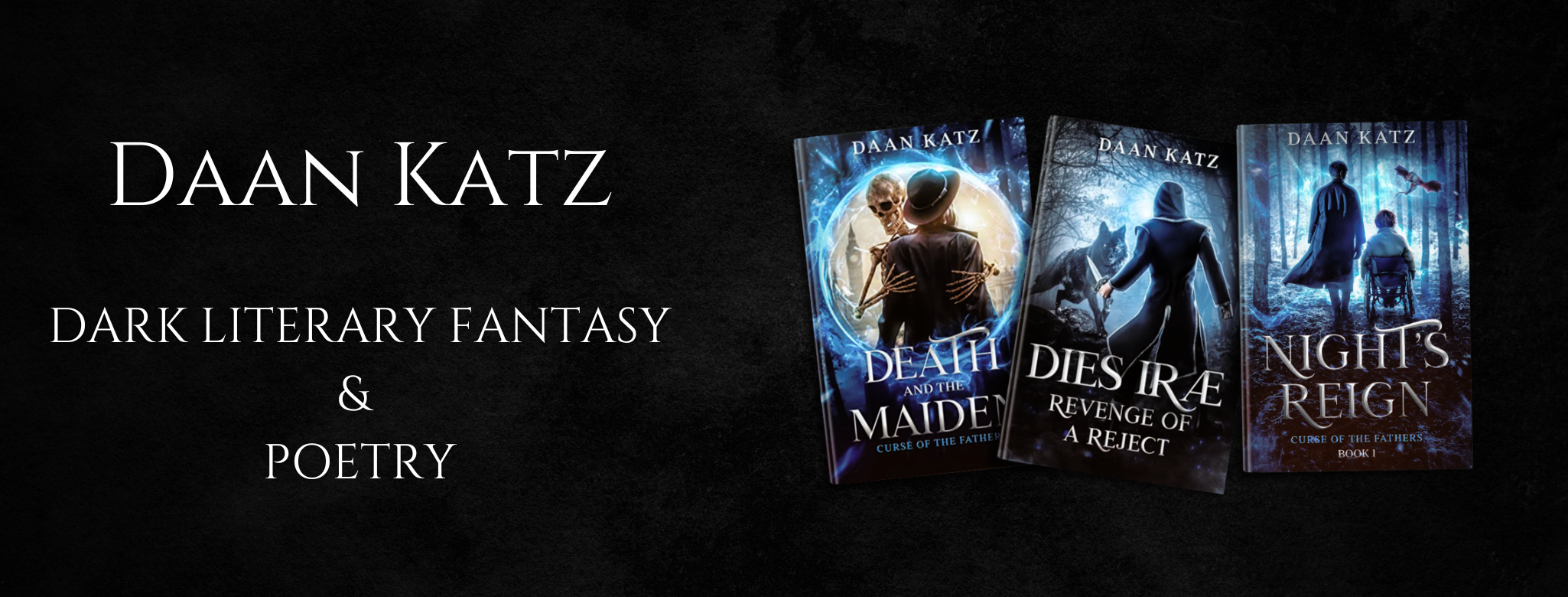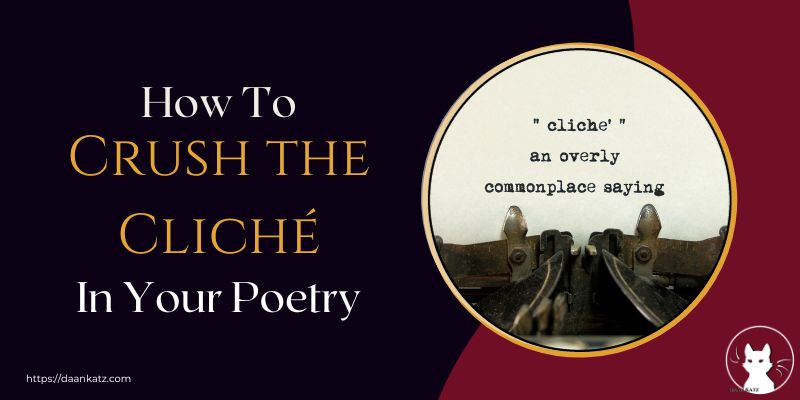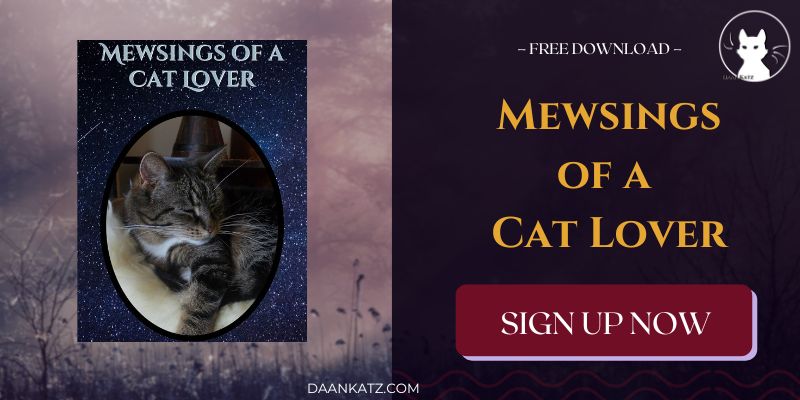3 November is Cliché Day! The perfect day to explore Clichés in Poetry and to find out how to crush them. Clichés in Poetry are definitely not my cup of tea. They should be left in the dust and avoided like the plague. Let me show you how to infuse your poems with originality that’s music to your ears.
Table of Contents
What Are Clichés in Poetry?
Clichés… We all know they are The Big Bad Evil in creative writing, but what exactly is a cliché?
DEFINITION A cliché is an idiomatic expression that has been used so often, it has lost its original meaning and no longer elicits powerful emotions or vivid mental imagery.
How to spot a cliché
To help you spot clichés more easily, I’ve listed some key characteristics to watch out for. Clichés are:
- Short and simple: while this makes them easy to grasp, it also makes them unremarkable.
- Done to death: Everyone and their mother uses them all the time, and their familiarity makes them almost automatic in your mind.
- Boring and predictable: Clichés are so predictable, you can often guess what words will come next. They don’t introduce any new ideas or perspectives.
- Uninspiring: Clichés are so worn out, they no longer engage our imagination or evoke a strong emotional response.
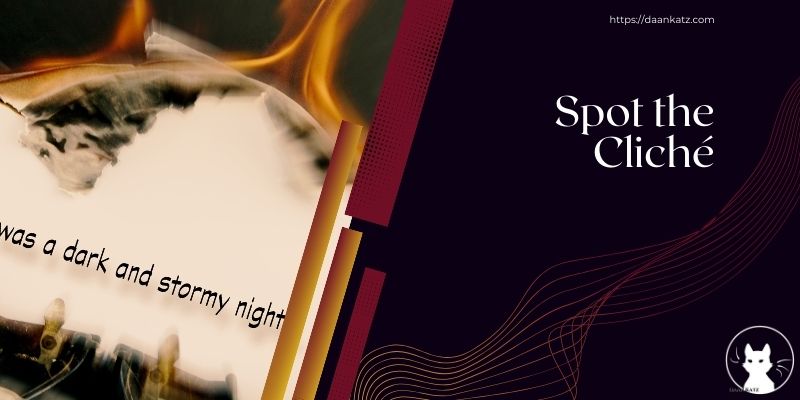
Clichés in poetry: literary crutches
New poets sometimes resort to the use of clichés in their writing—often even unaware of the fact that they are using them—because they are so easy to use. And, let’s be honest, it can be hard to express your thoughts and emotions in unique and innovative ways.
Unfortunately, this reliance on clichés results in uninspired poetry that fails to convey the poet’s meaning. Even worse, it weakens the emotional impact of the poem and diminishes the reader’s level of engagement.
Basically, clichés are poetic crutches that, while easy to lean on, ultimately ruin what might otherwise have been a commendable poem.
Why Do Poets Use Clichés?
But Mr Katz, you say, if clichés are so detrimental to poetry, why do poets even bother using them?
The allure of clichés in poetry
Imagine this scenario. You’ve had a hard day at your job and you come home tired, cranky and hungry. Do you immediately head for the kitchen to prepare yourself a nourishing meal?
Yeah, I didn’t think so. You might head straight for the kitchen, though. To grab yourself that leftover slice of pizza and a coke, right?
That, in a nutshell, is why poets are drawn to using clichés. They are the ultimate comfort food for word nerds.
Clichés are familiar and relatable
But there’s more to it. You see, clichés didn’t start out as trite, tired phrases. Once, they were fresh and unique, but… because of their high relatability, they’ve stood the test of time. Once, before they became worn out, they created an instant connection between the speaker and the listener, or between writer and reader.
Clichés in poetry: shortcuts to emotions
And that’s still not all. To top it off, clichés are champions at conveying the most complex emotions in clear and easily understandable language. Bye-bye long, elaborate descriptions. Hello simple emotional shorthand.
Given these seductive powers, is it any wonder that poets from all corners of the world succumb to the beguiling allure of clichés?
Pitfalls of relying on clichés in poetry
Let’s examine the dangers of relying too heavily on clichés.
Uniqueness and originality are two cornerstones of poetry. Clichés rob poetry of exactly these qualities. The poet’s authentic voice will be drowned out, or—worse—never fully develop. Their poetry will appear bland and uninspiring because it lacks creativity.
Another important task of poetry is to elicit a strong emotional response from its audience. Guess what does not happen when the poem is packed full of clichés? Indeed. We’ve all heard and used these worn-out phrases so often, they have exactly zero emotional impact.
The audience will lose interest and go looking for more imaginative poetry that stimulates their senses and evokes a sense of wonder.
Well-known clichés in poetry
Here are some of my best loved-loathed poetic clichés.
- Love is a battlefield. Can you seriously claim to read that phrase without getting that song stuck inside your head for the rest of the day?
- Roses are red, violets are blue. Sugar is sweet and causes diabetes and tooth decay. Oops! I think I got that rhyme wrong, didn’t I?
- Time heals all wounds. So cheap, and not even always true. Time typically does NOT heal emotional wounds, and as far as physical wounds go… Try dying before the wound starts to heal.
Reimagining Clichés in Poetry
Now that I’ve thoroughly discredited the poor cliché, it’s time to look at it anew. Because, YES, we can use clichés in our poetry. We just need to figure out how.
Put a unique twist on the cliché
- A cliché is only a cliché if we use it as is, without discretion or distinction. If we find imaginative ways to turn them into something new, we can make them sparkle with life.
- Every cliché has a message. If we take that message out of context, we can breathe new life into an otherwise worn-out expression.
- Tap into the power of subversion. Putting the cliché on its head or using it in an unexpected context may surprise and captivate the audience.
- Try combining two or more clichés into one and dazzle your audience with your unique perspective.
- Add a personal touch to the cliché by incorporating your own experiences and emotions. This will make it authentic and relatable.
Cliché Like a Boss
Langston Hughes breathes new life into the cliché of a dream deferred in his poem “Harlem (Dream Deferred)“.
Hughes cleverly combines the cliché’s biblical roots with the American Dream. The question “What happens to a dream deferred?” echoes the words from Proverbs 13:12 (KJV):
“Hope deferred maketh the heart sick: but when the desire cometh, it is a tree of life.”
In this poem, Hughes shows us how putting dreams on hold leads to disappointment. In addition, the poem provides a poignant reflection on the American Dream within a society marred by racial inequality.
This example shows that clichés can provide a skilful poet with the raw material for creative and engaging writing that will make their poetry stand out.
The Triolet Experiment
To celebrate Cliché Day, I thought it’d be fun to write a triolet featuring as many clichés as I could cram into it. It was a lot of fun, but strangely, quite a bit harder than it looks.
Here’s the result.
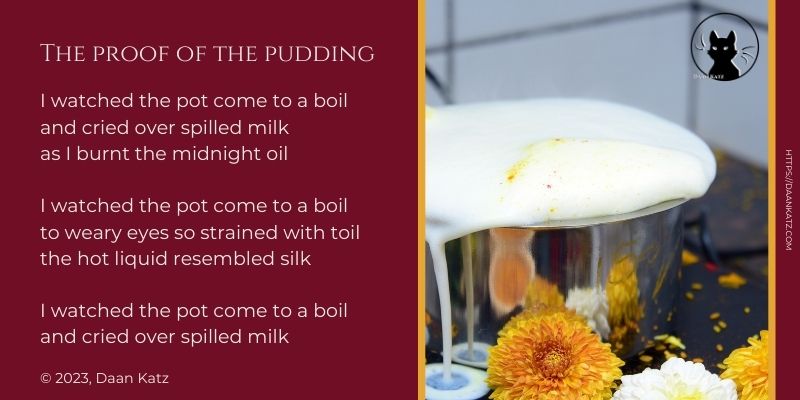
The proof of the pudding
I watched the pot come to a boil
and cried over spilled milk
as I burnt the midnight oil
I watched the pot come to a boil
to weary eyes so strained with toil
the hot liquid resembled silk
I watched the pot come to a boil
and cried over spilled milk
If you like this poem, why not sign up for my poetry newsletter, where I share a new poem every month? I’ll send you a FREE copy of my poetry bundle Mewsings of a Cat Lover—that’s not for sale anywhere—as a welcome present.
Challenges and insights
As I already mentioned, crafting a cliché poem wasn’t nearly as easy as I initially thought. First, I needed to find some clichés that would work well in this poem and, with English not being my native tongue, it was rather challenging to find those. Ultimately, I asked AI to generate a list of 20 clichés, which luckily gave me enough choice.
But soon enough, the next challenge arose. Because the triolet, my chosen form, relies on a tight rhyme-scheme, I needed to find rhymes. End-rhymes, to be more precise. And try though I might, I could not find any clichés that fit the bill. In the end, I faced defeat and opted to just go for the rhymes in lines 2 and 3 of the second stanza. It was either that, or give up entirely.
All in all, I’m pleased with the resulting poem. It may not be my best, but it certainly isn’t my worst either. At the very least, I like to think that it’s mildly entertaining and uses my chosen clichés in a new and unexpected way. And I did that simply by allowing my autistic brain to take those clichés literally, rather than figuratively.
Your Signature Style
To write poetry that truly stands out, you need to be creative and break free from conventional ideas. Make it your top priority to avoid clichés at all costs. This will allow you to develop your individual voice, your signature style that sets you apart from the masses.
The soul of the poem
Once you have found your voice, you will discover how satisfying it can be to write poetry that accurately reflects your unique personality. That’s what makes poetry so powerful: it has soul.
And soul, my friends, is what creates this ever elusive connection with your audience. It leaves a lasting impression on their minds.
Inspiration beyond the cliché
Now that we’ve thrown the cliché out of the window, where do we find our inspiration? Here’s how I do it.
- Observe and experience. I watch my cats, my garden, the weather, the neighbours… and I pay special attention to detail. There’s a reason why maybe half of my poems are about cats and their antics.
- Nature and everyday life. Really, I should go out in nature more, but my everyday life likes to disrupt my plans, and I end up writing about my everyday life. The ups and downs of being disabled.
- Experimentation. I love to experiment. New forms or styles, a challenging prompt… It flexes the creative muscle and keeps me sharp.
These are just a few ideas on where and how to find inspiration for your poetry. It’s not an exhaustive list, but rather a gentle push in the back to get you started.
Did you enjoy this blog post? Let me know in the comments.
Better yet: sign up for my poetry newsletter, where I share a new poem every month. I’ll also send you a FREE copy of my poetry bundle Mewsings of a Cat Lover—that’s not for sale anywhere—as a welcome present.
